When eggs go into lockdown on day 18, chicks prepare to hatch by positioning their beaks under their right wings towards the wide end of the egg where the air cell is. For much of the journey thus far, the embryo has been supplied with nutrients and oxygen through a system of membranes and blood vessels (namely: the allantois, yolk sac and chorion). Just prior to hatching, the chick pokes its beak through the membranes (pips) into the air cell and begins breathing with its lungs.
Chicken eggs are expected to hatch on or around day 21 into incubation and should generally hatch within 24 hours of the first pip in the batch. Various factors play into the process that can either advance or delay that schedule, primarily temperature fluctuations. Temperatures slightly higher than ideal can result in a premature hatch and physical challenges for the chick. Temperatures slightly lower than ideal can cause a delayed hatch and physical impairments.
I’m confident that my Brinsea Mini Advance incubator holds a rock solid temperature, but Egg #1, had its own agenda, deciding on Day 19, that it was time to get out of Dodge. It is reasonable to expect a chick to hatch within 12-24 hours of pipping. Egg #1 certainly wasted no time at all from pip to hatch, breaking free in less than 12 hours.
Day 19, 2:00 pm, first Pip
5:00 pm, making progress
9:00 pm, moving right along!
10:53 pm
11:15pm, this chick means business
As I write this, all of the chicks 26 hours have elapsed since the first pip and all four chicks have hatched. The chicks that hatch will wait in the incubator until they are dry and fluffy, up to 24 hours after they hatch. Opening the incubator before all of the eggs have hatched can hinder their ability to hatch.
If a pipped egg does not make progress by expanding the hole and chipping around the circumference of the shell within ~12 hours of the first pip, they may be unable to accomplish the job independently. Whether or not to assist in a hatch is a matter of personal preference. If the decision is made to help, the chick must have absorbed all of the blood in the membrane as well as the egg yolk in order to survive outside the shell. Intervening can result in the severing a blood vessel in the membranes, hemorrhage and death. Any assistance rendered should proceed very slowly and cautiously, stopping at the first sign of bleeding.
The egg in this video was brought to me by a local 4-H student= the chick had pipped more than 24 hours earlier.
Find everything you need to know about chick care in this article!
Hatch-along Part 1, Part 2, Part 3, Part 4, Part 5, Part 6, Part 7, Part 8
Kathy Shea Mormino
Affectionately known internationally as The Chicken Chick®, Kathy Shea Mormino shares a fun-loving, informative style to raising backyard chickens. …Read on


shop my SPONSORS
When eggs go into lockdown on day 18, chicks prepare to hatch by positioning their beaks under their right wings towards the wide end of the egg where the air cell is. For much of the journey thus far, the embryo has been supplied with nutrients and oxygen through a system of membranes and blood vessels (namely: the allantois, yolk sac and chorion). Just prior to hatching, the chick pokes its beak through the membranes (pips) into the air cell and begins breathing with its lungs.
Chicken eggs are expected to hatch on or around day 21 into incubation and should generally hatch within 24 hours of the first pip in the batch. Various factors play into the process that can either advance or delay that schedule, primarily temperature fluctuations. Temperatures slightly higher than ideal can result in a premature hatch and physical challenges for the chick. Temperatures slightly lower than ideal can cause a delayed hatch and physical impairments.
I’m confident that my Brinsea Mini Advance incubator holds a rock solid temperature, but Egg #1, had its own agenda, deciding on Day 19, that it was time to get out of Dodge. It is reasonable to expect a chick to hatch within 12-24 hours of pipping. Egg #1 certainly wasted no time at all from pip to hatch, breaking free in less than 12 hours.
Day 19, 2:00 pm, first Pip
5:00 pm, making progress
9:00 pm, moving right along!
10:53 pm
11:15pm, this chick means business
As I write this, all of the chicks 26 hours have elapsed since the first pip and all four chicks have hatched. The chicks that hatch will wait in the incubator until they are dry and fluffy, up to 24 hours after they hatch. Opening the incubator before all of the eggs have hatched can hinder their ability to hatch.
If a pipped egg does not make progress by expanding the hole and chipping around the circumference of the shell within ~12 hours of the first pip, they may be unable to accomplish the job independently. Whether or not to assist in a hatch is a matter of personal preference. If the decision is made to help, the chick must have absorbed all of the blood in the membrane as well as the egg yolk in order to survive outside the shell. Intervening can result in the severing a blood vessel in the membranes, hemorrhage and death. Any assistance rendered should proceed very slowly and cautiously, stopping at the first sign of bleeding.
The egg in this video was brought to me by a local 4-H student= the chick had pipped more than 24 hours earlier.
Find everything you need to know about chick care in this article!
Hatch-along Part 1, Part 2, Part 3, Part 4, Part 5, Part 6, Part 7, Part 8



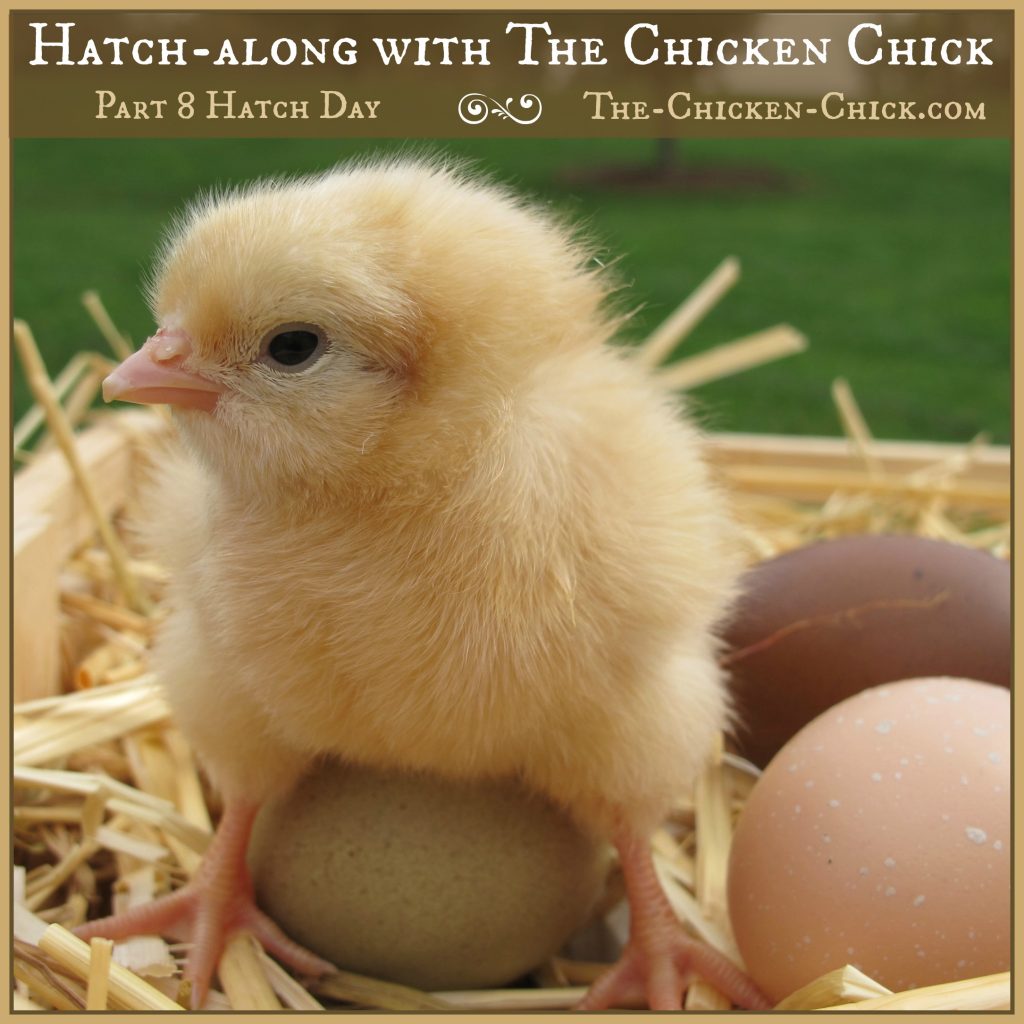
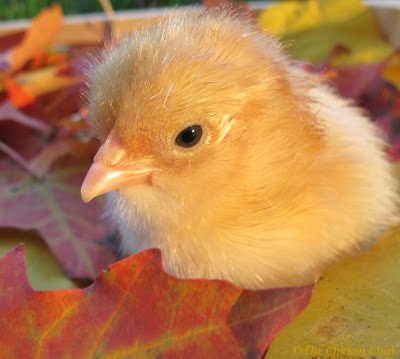
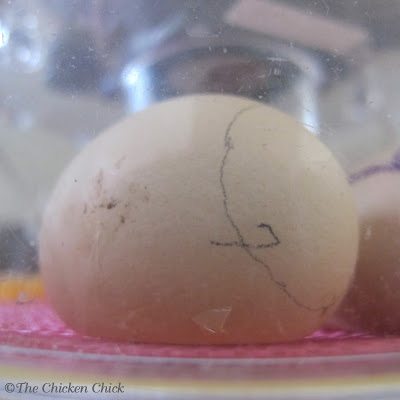
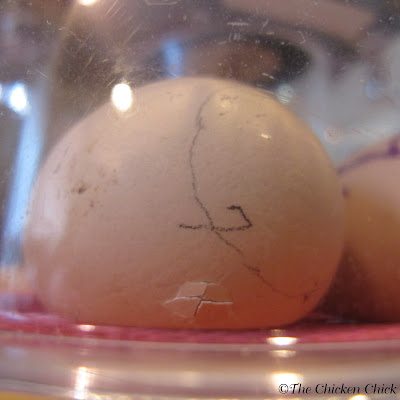
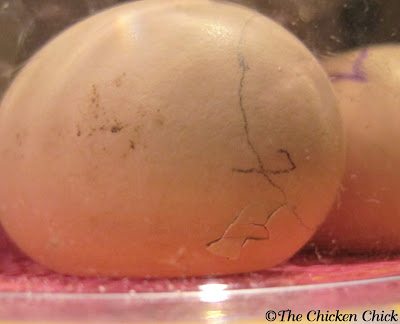
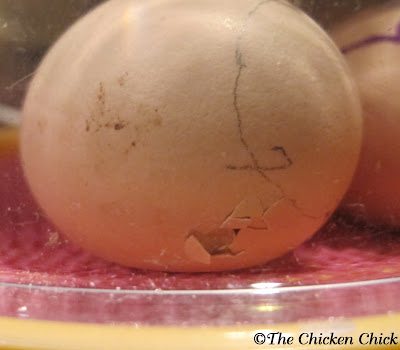
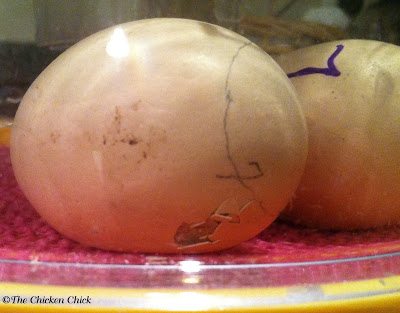
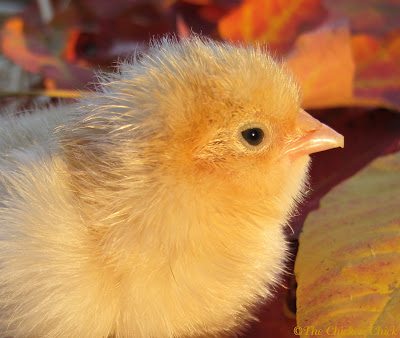






















Awesome! I guess chick #1 really wanted to get out :)
Wonderful! That was a lot of work for that little chick! I loved the video.
Woot! My first hatch and I have some pips and hear some cheeping ;-) so excited!
At what age can a roster do his job? I see him try but it does not look like he makes contact..
YAY!…Happy Birthday babies…that was fun and so interesting to me,I loved the video and also watched the other ones,love the song "I'll tumble for ya" while the chick was hatching.